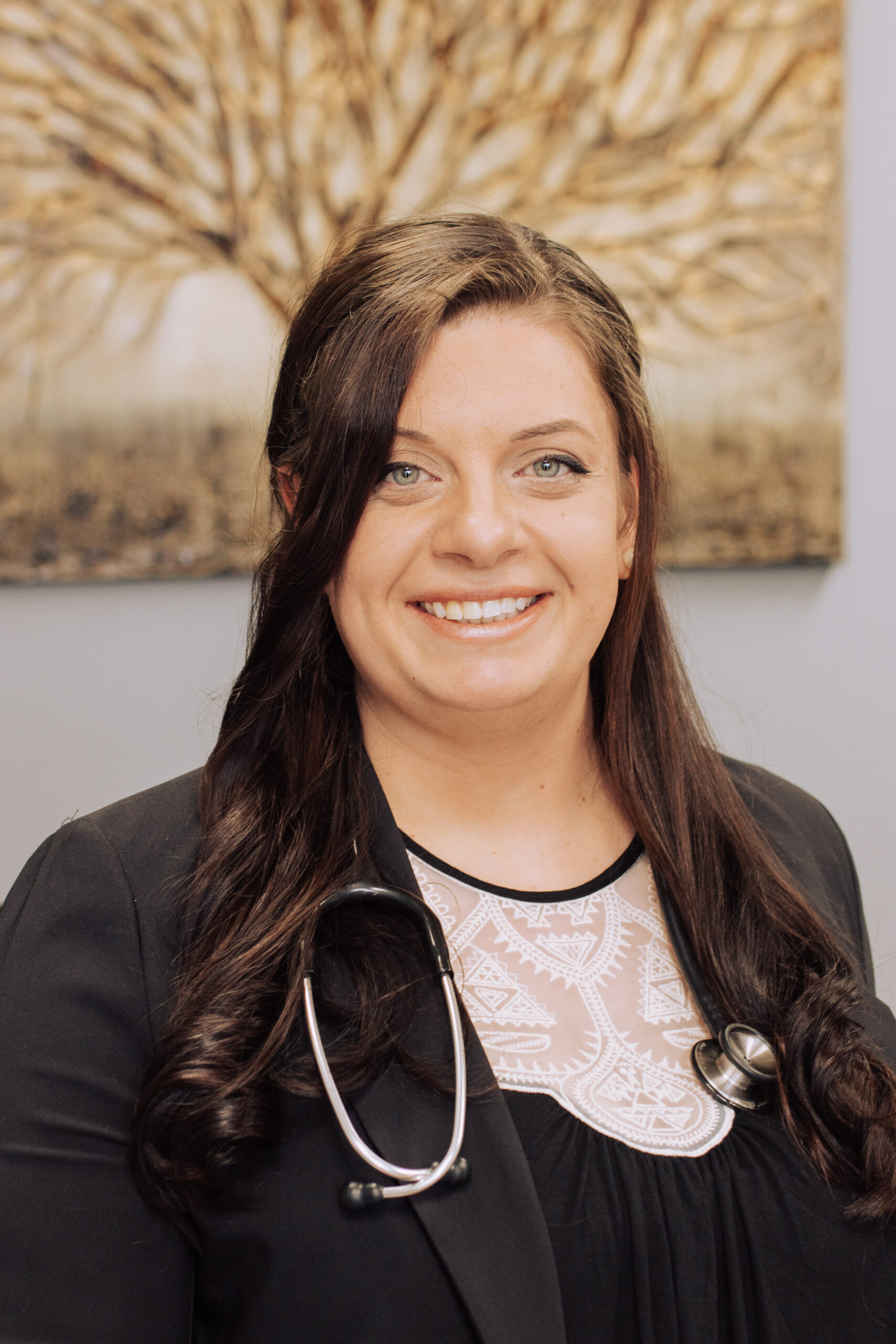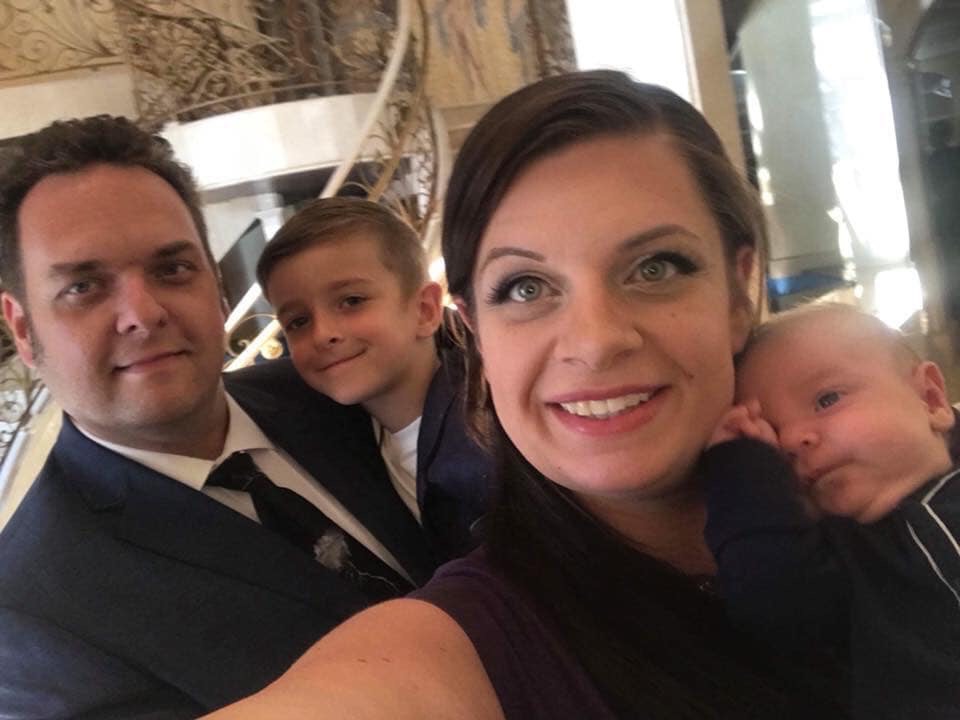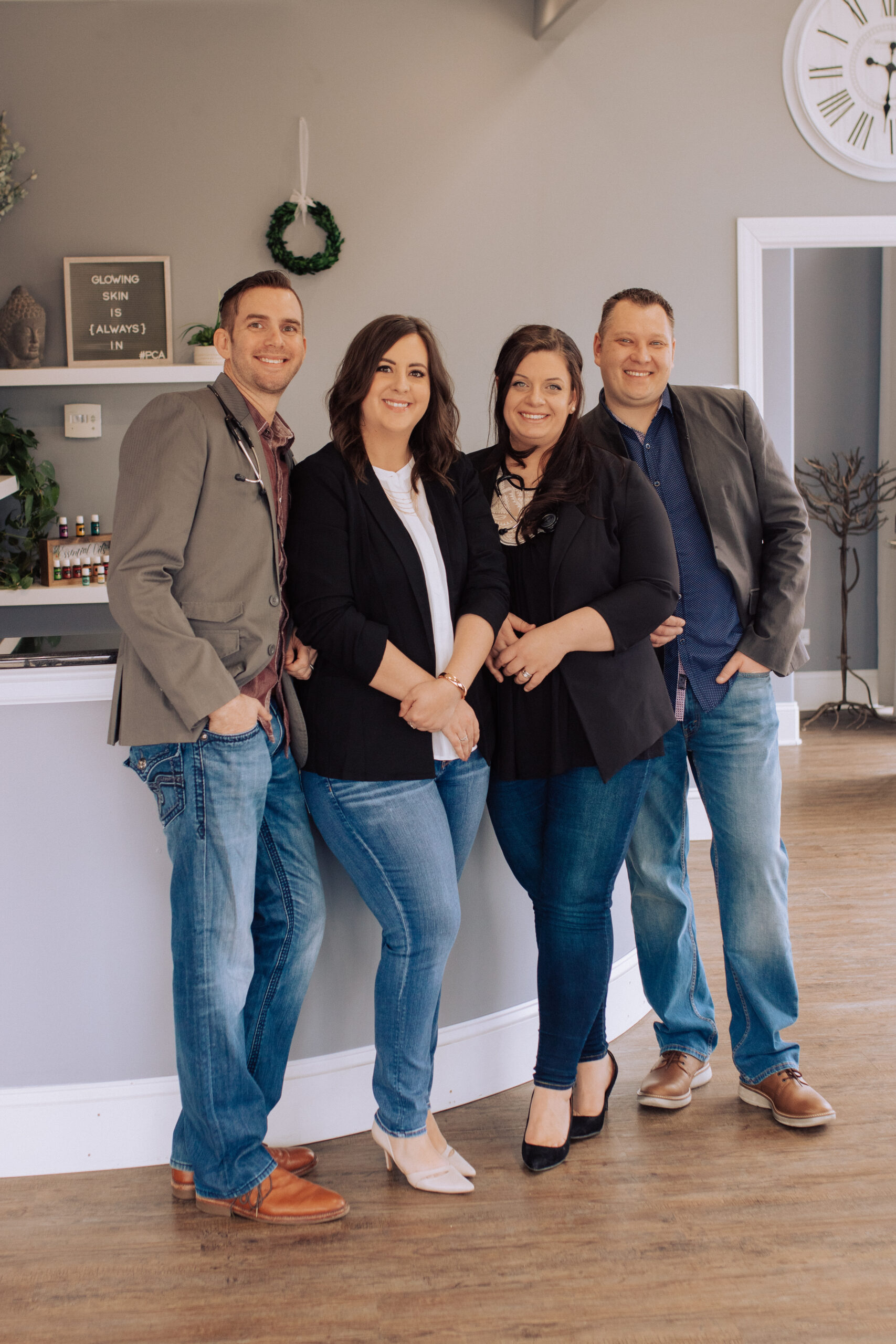Tell us a little bit about yourself and your background before becoming a nurse.
I come from a traditional Polish family, first generation to be born in the United States. Most of my childhood, however, was spent splitting my time between the U.S. and Poland. Some of my fondest memories were from three-month vacations spent at my family’s summer home in the rural outskirts of Łódź, Poland.
I met my husband at a young age and we’ve been high school sweethearts ever since. We married soon after high school while both attending college. Two kids, a dog, and a mortgage later we are still happily together and looking forward to what lies ahead in life. At the age of 22, I completed a Bachelor of Science in Mathematics, graduating with honors and the title of Vice President of The National Mathematics Honor Society, Iota Chapter. With that, I spent the next few years teaching at the middle school level before leaving the field to pursue nursing.
I ended my teaching career because it just wasn’t gratifying. I taught over 150 students each day. This meant innumerable lesson modifications, administrative work, and grading that piled so high I would need additional hands to help me carry everything to-and-from my car. I felt overworked, stressed, and underappreciated. Meanwhile, I had students that would share the most unimaginable stories about their homelife. Some I wish I had never heard, because I cannot erase from memory. I still worry about those students. That’s when I realized that no matter how hard I worked, and how thin I stretched myself to accommodate for each student, they would still leave my classroom with the feeling of not receiving the one-to-one care they crave. There just weren’t enough hours in the day to meet all the needs of my students.
How did you know you wanted to pursue a career in nursing?
During that time, I spent many weekends helping care for my elderly grandparents who were receiving home health and hospice care. I would often meet their home nurses and observe the level of care they provided. I was impressed by the time they took to check in on the primary caretakers as well as the patients. They often made recommendations for respite care and community resources that would help us with any grief or emotional distress we may be experiencing as caretakers. Many of the nurses became like family and made us feel like we could connect on a personal level. This was above and beyond the level of care I could ever give a classroom full of 7th graders.
I realized then that I needed to pursue nursing where I would have more contact with my patients and build personal relationships. I am often asked, “Why did you leave teaching to pursue a career in bedside nursing?” My answer is always, “I was never able to meet the needs of 150 students, but I can exceed the expectations of my five patients.”
What was the journey of attending nursing school and becoming a family nurse practitioner like?
In order to be accepted into a Bachelor of Science in Nursing (BSN) program, I needed to return to community college to complete a handful of biology and chemistry courses. Although it only took a few semesters, it helped prepare me for the rigor I was about to endure. I was accepted into an Evening-and-Weekend Accelerated-BSN program at Resurrection University in 2013 and graduated in 2015. The BSN program was quite challenging, or rather very challenging. Not only are the courses and clinical expectations rigorous, but I worked 50+ hours during the entire program and had a newborn at home. Most months I worked five-days a week, evening classes at least four out of those five evenings, and two 12-hour shifts as a clinical student on the weekends. I realized that I was working 10-to-12 hours shifts (plus 4-hour evening lectures) for 23 days straight before I would earn one day off, and then I would work another 17 days after that to earn another day off. There were some mornings I remember hearing my alarm go off and I would just sob all the way to work, or the hospital. I even remember shaking from exhaustion because my newborn kept me up all night with teething pains.
Just recently a former classmate reminded me that they would often compare themselves to me. After a long day at work or school they would say, “Wow, I am so tired. I may not be ‘Katherine tired’ but I’m still tired.” I just kept pushing myself. I pushed every inch of the way. First to work, then to class, then home, feed/bathe/play with the baby, study, sleep, do it all over again-and-again. For two years, I worked harder than I ever had before. I felt that I had to prove that you can change careers, you can go back to school, you can start all over again and be happy this time. But who was I proving this to? Myself? My family? Everyone who has ever contemplated restarting their life? I was going above-and beyond for everyone that could benefit from seeing me do it because that’s what nurses do.
I even remember walking into class one day, head down, heavy bag, just getting to my seat and setting out my things. My classmate turned to me and said, “You look like hell, pale and sleep-deprived, and we are all pretty sure you’re going to die by the end of lecture.” I looked up at her and a handful of students who were unanimously nodding their heads. My response was, “I’ll be fine, just a few more months until graduation.” That was true, we graduated in April of 2015, and I was offered my first nursing position in June of that year. By August, however, I returned to Resurrection University to pursue a Master of Science in Nurse (MSN), specifically to become a Family Nurse Practitioner (FNP).
The MSN program was even more difficult than the bachelors. The expectations were higher, academic demands even more rigorous. Somehow, I knew that if I could survive those last two years, why not another two years. My husband and I both agreed that if having a master’s degree was going to be my end goal, I better do it while our son is small and won’t remember Mommy being at work or school all the time. With that in mind, I just had to keep the mentality of having ‘two years down, two more to go.’ I can do it, I’m going to do it, nothing is going to stop me.
What were some of the obstacles you were faced with on this journey, and how did you overcome them? What did you learn from them?
Three of the most important words in my life come to mind, “Work. School. Family.” The biggest obstacle I faced was trying to balance all three of those major components of my life each day. During most of my MSN program, specifically the later half, I worked as an overnight nurse, which allowed me to complete FNP residency hours during the day. How can I fit 12 hours of work, 8 hours of residency, and at least a few hours of family time into each day? I couldn’t. There aren’t enough hours in a day unless I just stop sleeping at together. So that’s what I did. My typical day started at 6:00am with waking up and heading to a provider’s office where I would do residency hours from 8:00am to 5:30pm. Then I would quickly change into scrubs and head to the hospital where I worked from 7:00pm to 7:30am. Change back into a new outfit and head back to the provider’s office for more residency from 8:00am to about 2:00pm. Then I would finally head home (having not seen my family in two days) and spend time with them. I would try to limit myself to a one hour nap, so as not to take away from family time, before spending the rest of the evening playing with my preschool-aged son, cleaning up, trying to cook something to eat, and catching up on all the other demands of homelife. The next day it started all over again.
I did everything in my power to not let any of the components in my life (work, school, family) suffer because of me, but no matter how hard I tried, I realized I could only do two thing well at any given time, on any given day, and the third would have to suffer. I could go to work and spend time with family, but I would neglect schoolwork or residency hours that day. The next day I would refocus myself on school demands and work, but I wouldn’t spend much time with family that day. I felt so guilty for having to split my time so thinly and neglecting family time. It was difficult emotionally, but my husband and I knew what we were getting into and he was immeasurably supportive throughout the program. Although frustrated at times, he never said ‘no’ when I said, ‘I have to go.’ I had to go study, I had to work, I had to do hours. All those demands that kept me from my family at the time would soon come to an end, and they did. Just before my very last semester of school, I took a short few weeks off (from school) to spend more time at home with my husband, kindergartner, and our newborn baby boy. It was short, but it helped us reconnect as a family. I returned to work and school after a six-week maternity leave and completed my last residency at a primary care clinic called Elemental Care Health & Wellness. Little did I know at the time but being there would soon become a turning point in my life. I graduated in December of 2018, became a Board-Certified Family Nurse Practitioner and found myself back in front of the classroom once again.
Did you ever have moments of doubt? How did you continue to push yourself to follow your dreams?
I never doubted myself. Not when came to my academic abilities and the demands of school and work. I always knew that I would go through hell-and-high waters to get what I wanted, and I was ready and willing. I did, however, receive doubt from others quite often. I had coworkers, even family members, telling me that I wouldn’t get through the programs. I had to expend my own energy encouraging them to believe in me and to prove that I would reach my goals. Some days I laughed it off because it was coming from a friend or coworker who I don’t really depend on for support. But when its coming from family, it’s a different feeling. I’m not sure if it was their odd way of encouraging me, but every phone call would lead to, “I don’t know Katherine, its sounds like a lot of work, I don’t think you’ll get it done in time.” It hurt. I’ll admit that. As much as I try to live to be of service to others, I realize that sometimes it would be nice to be on the receiving end of motivation, encouragement, confidence, and support. I wouldn’t get that until after I proved that I finished the degree- after I walked across the stage. I learned to seek support where support is offered. That’s where my husband always shined. He celebrates every quiz, test, or project right alongside me and always speaks highly of my accomplishments.
You are also a college nursing instructor, and doctoral candidate, what has that journey been like? How do you balance all of it?
Just a few weeks before graduation, I had already begun poking around for job opportunities and preparing myself for a difficult search for the right job. I wanted to be a provider in a clinical setting, as well as spend a small portion of my time giving back to the Nursing Education community as a part-time clinical instructor. Luck would have it that my career plans would somehow change once again. I was interviewed for a part-time teaching position at Morton College, a few tweaks and interviews later, it ended up becoming a full-time teaching offer which I accepted. As mentioned previously, I had just completed my residency hours at Elemental Care Health & Wellness which became a part-time Primary Care Provider position. So, I’ve finished school, I’ve found two great jobs that allow me the flexibility to practice and teach, and I’ve got plenty of time to spend with my husband and sons. Most people would stop here. Life is perfect. Done. But nurses will always doubt what they’ve done and ask, “What more can I do?”
With that in mind, I came to the realization that there is always more that I can do for my patients and my students. I can provide better care and a more comprehensive learning experience. For this reason, my husband and I decided its time to go back to school. I began the Doctor of Nursing Practice (DNP) program as Resurrection University in the fall of 2019. The focus of my research will be the prevalence of polydrug addition, addiction transfer, and the impacts of such on treatment plans.
Which of your achievements are you most proud of?
Raising my sons to be kind, caring, compassionate men despite being so busy with school and work during their youngest years is my greatest achievement. Although I felt as though I was absent for most the last five years of their lives, the boys and I have a mother-and-son bond that’s unbreakable. My older son, who is six years old now, has a very mature and respectful personality. He always includes every child in play, no matter the age or ability, and his soccer skills have earned him a spot on a well-known soccer team in our community and he will be playing with teammates who are older than him. My husband has also accomplished much in his life with work, school, and family balance as well. He is earning a Bachelor of Science in Geology (con. Operational Meteorology) from Mississippi State University all while balancing his own goals and responsibilities. Soon after completing of that degree, he will begin the Master of Science in Geology program as well. Its very important to me that our son’s see us working hard to achieve personal goals in life, no matter the age or situation we are in. I can see that our son is picking up these good habits and working towards goals instead of staying stagnant. I want both boys to have that drive and passion, and to keep it going for the rest of their lives.
What are your next goals? What else are you working towards?
My next goal is to begin to understand the drive and motivation behind my patient’s choices and lifestyles that lead them to seek my help. In doing so, I hope to prevent certain diseases from progressing or treatments from failing. One major issue I have seen many of my patient’s face is addiction. Although I am a SAMHSA (Substance Abuse and Mental Health Services Administration) certified provider that treats addiction to narcotics and such, I would also include alcoholism, nicotine, gambling, over-eating, and over-dieting to the umbrella of addiction. As part of my doctoral program, I hope to use the research I conduct in my clinical practice setting to develop treatment plans that are more holistic and comprehensive.
What does being Simply Unstoppable mean to you?
A woman’s mindset is the strongest part of her body. That passion and drive that women have cannot be held back. We will create a fury of strength from nothing if our mind says that we must. I’ve heard of mom’s lifting cars off the ground to save their children in life-or-death situations. Having given birth twice, I have experienced that moment when no pain in this world will stop me from ensuring that my baby is ok. Spending the last few years of my life being of service to others or education, I feel that I still haven’t done enough. I have created this unstoppable drive to reach some goal that no longer recognize. I thought being a nurse would be enough. Then I thought being a Nurse Practitioner and Educator would be enough. Now I want to influence the masses. Then there will be something else, and something after that. Being Simply Unstoppable means, you have already achieved that goal or milestone, simply by setting your mind to do it.



